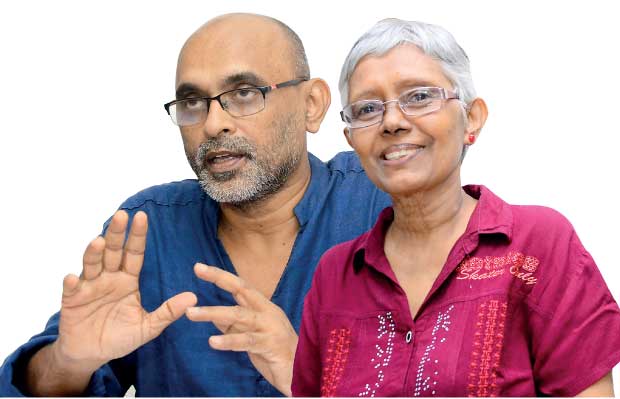Reply To:
Name - Reply Comment
Last Updated : 2024-04-27 04:40:00

Many professions in Sri Lanka enjoy social respect; why not the media?
 In June 1992, the Free Media Movement (FMM) was formed by a group of journalists and media activists with the purpose of creating a safe environment for journalists and an environment for freedom of expression.
In June 1992, the Free Media Movement (FMM) was formed by a group of journalists and media activists with the purpose of creating a safe environment for journalists and an environment for freedom of expression.
The organization turned 25 this year and as the landmark event of its 25th anniversary, the FMM held a ‘National Summit on Free Media Culture with Social Responsibility’ on November 21, 2017 at the Lakshman Kadirgamar Institute. Many print, electronic and online media personnel, activists, policy decision makers and academics were present at the event where discussions on the struggle to end the animosity against journalists in Sri Lanka and a collaborative approach to media reforms and future challenges were held.
It should be accepted that Sri Lankan media men especially provincial correspondents are confronting challenges in lack of media professionalism and the sustainability of media institutes. It is essential to strengthen media professionalism as it makes media personnel understand how to use the given freedom properly
One of its founding members Lakshman Gunasekara referring to the emergence of media suppression in the late 1980s, spoke about a need for a strong media movement in order to urge authorities to restore freedom of expression and ensure the safety of journalists. He said what made the FMM different from other media organizations was its contribution and the instances where it had stood against not only issues pertaining to journalists, but to all groups in society.
Emphasizing the importance of media professionalism, FMM Convener C.Dodawatta said it is essential to strengthen media professionalism because it makes media personnel understand the manner in which the given freedom is used without abusing it but responsibly in the role of a watch dog.
“There are two sides of this issue. What we can do to solve the issue as a media organization is actually limited to some extent. It should be accepted that Sri Lankan media men especially provincial correspondents are confronting challenges in lack of media professionalism and the sustainability of media institutes. It is essential to strengthen media professionalism as it makes media personnel understand how to use the given freedom properly,” he said.
According to him, the FMM had organized a number of training programmes and awareness programmes for provincial correspondents and reporters from rural areas. The programmes incorporated media ethics, standards and safety practices of the media and investigative reporting. Currently, there are four programmes being held in four provinces covering methods of investigative reporting.
He went on to say: “All the members of the FMM are working on a volunteer basis. It adds to the fact that there are limited resources and also a limited output that our organization could provide. But, we are trying our best to make the greatest impact.”
Ownership is probably the greatest influence on that issue. Support and contribution of media institutes is in a sorry state. Proprietors of media institutions also have a responsibility in terms of professional training
Dodawatta stressed that a national policy should be introduced to recognize professionalism of media personnel. “Policy decisions should be made by the authorities with regard to this. Media literacy is not provided even in schools. If it can be made a practical subject rather than involving theoretical aspects, the root of many issues can be resolved. Attitudes should be changed on how to maintain standards and ethics while working as journalists.”
He was of the view that a half-baked professional who will certainly malfunction is akin to a faulty machine that cannot give a correct out-put. He added; “Ownership is probably the greatest influence on that issue. Support and contribution of media institutes is in a sorry state. Proprietors of media institutions also have a responsibility in terms of professional training.” He also said that media institutes in the country should prioritize initiatives to enhance media professionalism through the implementation of more coordinated approaches to human resource development.
He underscored that by saying there is a handful of media institutes that are maintained genuinely as media institutes.
“They are not run on charity but investments that must yield profit to their owners. Some of the owners set up these media organizations in the country for political reasons. Some others engage in the media to launder black money. Proprietors of such media institutes don’t bother about the professionalism of their journalists and reporters. Owners have used it as a means of satisfying their quest for power and wealth. It is enough for them to get their work done by journalists,” Dodawatta remarked.
Another founding member of the FMM, Seetha Ranjanee was of the view that there needs to be an institute parallel in function to an ‘administrative board’ to address issues related to media personnel.
“All such issues will be addressed once professionalism of media personnel is established. Society’s attitudes towards journalists will also be changed thereafter. Welfare issues such as salaries of journalists should be backed by trade unions which I think have a major role to play in pressurizing the relevant authorities to do what is required,” she said.
“A number of major media institutes were closed in the last few months. Does anyone care how many journalists lost their livelihoods? Journalists are left at cross roads in the country from choosing between professionalism and survival. Amidst such confusion the non-payment of salaries to journalists has also arisen when due. This is despite the fact the salaries are not enough to take care of the basic needs of the journalists. These issues were not even a topic among other media personnel.”
“When we were informed about welfare issues, we instructed them and proposed to make a collective movement in order to demand for their rights from the heads of the institutions that employ them. Sadly, that is exactly what our journalists are lacking; collective [bargaining] and unity. Each tries to make individual attempts to save their own jobs. Since many media institutes are begun with different agendas in view, once their agenda is completed or if they realize obstacles or difficulties are hard to face, they give up the projects and shut down the institutes, leaving dozens of journalists helpless and jobless,” Ranjanee said.
Various professions the world over have carved identities for themselves which they depend on for pride and prestige. Highlighting the major role that the government has to play in establishing professionalism of journalists, she said that the relevant authorities should ensure that social respect given to other professions is given to the media as well.
A number of major media institutes were closed in the last few months. Does anyone care how many journalists lost their livelihoods? Journalists are left at cross roads in the country from choosing between professionalism and survival
Dodawatta, responding to a question regarding allegations levelled against the FMM, said since the beginning, the FMM has received financial support from various Non-Governmental Organizations and donors for its projects and programmes and that the FMM membership did not see anything wrong in it.
“It is not important to talk about the source of income but what is done using that money. The FMM has done quite a lot good stuff. Obtaining foreign funds should not be a problem because even the Sri Lanka government receives financial support from rich countries. Individually, FMM members are not financially strong to bear all the expenses of the organization. It is indeed a common feature in organizational culture to accept any financial support for its progress when offered,” he said.
Pics by Waruna Wanniarachchi

Add comment
Comments will be edited (grammar, spelling and slang) and authorized at the discretion of Daily Mirror online. The website also has the right not to publish selected comments.
Reply To:
Name - Reply Comment
US authorities are currently reviewing the manifest of every cargo aboard MV
On March 26, a couple arriving from Thailand was arrested with 88 live animal
According to villagers from Naula-Moragolla out of 105 families 80 can afford
Is the situation in Sri Lanka so grim that locals harbour hope that they coul